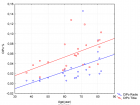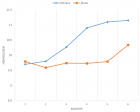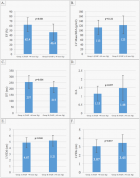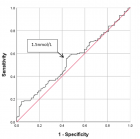Abstract
Review Article
The Importance of Potato virus Y Potyvirus
Mahmoud Hamdy Abd El-Aziz*
Published: 19 February, 2020 | Volume 4 - Issue 1 | Pages: 009-015
Potato virus Y Potyvirus (PVY) is one of the most important aphid transmitted viral pathogen of potato worldwide. PVY affects potato plant (Solanum tuberosum L.), which is an important economic crop. PVY infection with potato viruses usually causing severe economic damage affecting both tubers quality and trade. PVY can degrease the production of certified seed and also crops grown for processing or fresh market. Potato is considered as one of the most economically important solanaceous crops cultivated in different regions that (PVY) has been studied in many parts of the world. Wide host plant range is a characteristic of viruses belonging to the Potyviridae. 495 species in 72 genera of 31 families were reported to be infected by PVY. Under field conditions, potato plants are subjected to attack by many viruses. The most cited virus could affect potato in the world is PVY. It has been long recognized as a threat to potato cultivation. Several studies carried out and reported that PVY is the most important virus infecting potato in different localities. Our review article is showed that PVY are the most frequently detected viruses in potato.
Read Full Article HTML DOI: 10.29328/journal.jpsp.1001044 Cite this Article Read Full Article PDF
References
- Smith KM. Composite nature of certain potato viruses of the mosaic group. Nature. 1931; 127: 702.
- Abd El-Aziz MH, Behiry SI, Younes HA, Hamza KA. The relationship and relativity between three isolates of Potato virus Y Potyvirus infecting potato (Solanum tuberosum L.) at Alexandria and El-Beheira governorates in northern Egypt. Novel Research in Microbiol J. 2019; 3: 440-452.
- Abdel-Shafi S, Ghaly M, El-dougdoug K, Taha M. Physiological and Infectious Characters of Potato virus Y-Egyptian isolate. Egyptian J Microbiol. 2017; 52: 141-155.
- Allam EK, Omar RA, Kishtah AA. A strain of potato virus Y (Tobacco veinal necrosis strain) (TVN) affecting potato in Egypt. Annals Agric Sci Fac Agric. 1973; 18: 91-99.
- Beemster ABR, de Bokx JA. Survey of properties and symptoms. In: de Bokx JA, Van der Want JPH (eds.). Virus of potatoes and seed-potato production. Pudoc Wageningens. 1987; 84-113
- Hamza KA, Abd El-Aziz MH, Behiry SI, Younes HA. Isolation and purification of potato virus y isolate infecting potato (Solanum tuberosum l.) in al-nubaria region. Middle East Journal of Agriculture Research. 2018; 7: 1201-1207.
- Boonham N, Walsh K, Hims M, Preston S, North J, et al. Biological and sequence comparisons of Potato virus Y isolates associated with potato tuber necrotic ring spot disease. Plant Pathol. 2002; 51: 117-126.
- Adams MJ, Antoniw JF, Fauquet CM. Molecular criteria for genus and species discrimination within the family Potyviridae. Archives of Virology. 2005; 150: 459-479. PubMed : https://www.ncbi.nlm.nih.gov/pubmed/15592889
- Walsh K, North J, Barker I, Boonham N. Detection of different strains of Potato virus Y and their mixed infections using competitive fluorescent RT-PCR. Journal of Virological Methods. 2001; 91: 167-173. PubMed: https://www.ncbi.nlm.nih.gov/pubmed/11164498
- Abd El-Aziz MH, Hamza KA, Younes HA. Serological and Molecular Studies on potato virus y. NOOR Publishing. 2019; 85.
- Omar RA, Tolba MA, Kishtah AA. Strains of potato virus Y (PVY) affecting potato crop in A. R. E. 1st con of the Egypt. Phytopathol Soc Cairo. 1973; 7.
- Mansour A, Haj-Kasem AO, Salem N, Choueiri E, Abou-Jawdah Y, et al. Viruses infecting potato. Pages 273-308. In:Virus diseases of important crops in Arab region. Makkouk K, Fegla G, Kaumari S (eds). Dar EL-Nahda EL-Arabia. 2008; 273-308
- Ahmad AY. Studies on some viral diseases infecting potatoes. Ain Shams University. 2005; 120.
- Al-Nagar AM. Studies on some plant virus diseases of some vegetable crops. Al-Azhar University. 2007; 165.
- Mahfouz SA, Allam EK, Afifi AM, El Dougdoug KA. Isolation of different isolates of PVX, PVY and PVS from naturally infected potato plants. The Ninth Conference of Agriculture Development Researches, 2004; 22-24.
- Shukla DD, Ward CW, Brunt AA. "The Potyviridae". CAB International. 1994; 102.
- Sharma P, Sahu AK, Verma RK, Mishra R, Gaur R. Biological and molecular characterization of Potato VirusY infecting potato (Solanum tuberosum) in India. Asian Journal of Biological Sciences. 20413; 6: 257-264.
- Pennazio S, D’Agostino G, Appiano A, Redolfi P. Ultrastructure and histochemistry of the resistant tissue surrounding lesions of tomato bushy stunt virus in Gomphrena globosa leaves. Physiological Plant Pathology. 1978; 13: 165-168.
- Mustafa S, Mosahebi G, Habibi MK. Potato virus Y isolated from pepper fields in Tehran Province. Commun Agric Appl Biol Sci. 2006; 71: 1335-1340. PubMed: https://www.ncbi.nlm.nih.gov/pubmed/17390898
- Kazinczi G, Horváth J, Takács AP, Gáborjányi R, Béres I. Experimental and natural weed host-virus relations. Commun Agric Appl Biol Sci. 2004; 69: 53-60. PubMed: https://www.ncbi.nlm.nih.gov/pubmed/15759395
- Rich AE. Potato Diseases. Academic Press. 1983; Pg no: 238.
- Horvath J. Studies on strains of potato virus Y. Acta Phytopath. 1966; 1: 333-352.
- Whitworth JL, Samson RG, Allen TC, Mosley AR. Detection of Potato Leaf roll Virus by visual inspection, direct tissue blotting and ELISA techniques. Amer. Potato J. 1993; 70:497-503.
- Smith KM. Plant virus diseases. 3rd (Ed.) Longman Group Limited. 1972; 684.
- Laird EF, Desjardins PR, Dickson RC. Tobacco etch virus and potato virus Y from pepper in Southern Californis. Plant Dis Reptr. 1964; 48: 772-776.
- Lockhart BEL, Fischer HU. Serious losses caused by potato virus Y infection in peppers in Morocco. Plant Dis Reptr. 1974; 58: 141-143.
- Harrison BD. Potato viruses in Britain. In: Diseases of crop plants (JH Western, ed.). 1971; 123-159.
- Rich AE. Potato diseases. In: Potatoes production, storing, processing (O. Smith) 2nd ed. Avi Pub Westport. 1977; 506-549.
- Eskarous JK, Habib HM, Kishtah AA, Ismail MH. A strain of potato virus Y isolated from Solanum nigrum var. judaicum in Egypt. Phytopatologia Mediterranea. 1983; 22:53-58.
- Park EK, Kim J, Boo KS. Two new PVY strains isolated from tobacco plant in Korea. Korean J of Plant Protection. 1984; 23: 209-214.
- Piccirillo P, Piro F. PVY strains on Burlet tobacco in Southern Italy. In Coresta 1986. Symposium, Taormina. 1986; 26-30.
- Nagai H, Smith PG. Reaction of pepper varieties to naturally occurring viruses in California. Plant Dis Reptr. 1968; 52: 928-930.
- Vasudeva KS. A vein-banding mosaic disease of chillies (Capsicum fructescns L.) Indian J. Microbiol. 1961; 1: 94-99.
- El-Hammady M, El-Zayat ME, Hasaaniann SH, Kishtah AA, Ibrahim LM. Studies on potato virus Y and tobacco mosaic virus on pepper plants with special regard to varietal susceptibility. 8th International Congress. Ain Shams Univ Press. 1983; 26-31.
- Nelson MR, Wheeler RE. Biological and serological characterization and separation of potyviruses that infect peppers. Phytopathol. 1978; 68: 979-984.
- El-Said HM, Allam EK, Mazyad HM, Sabik AM. Viruses affecting gladiolus in Egypt. II. The effect of virus infection on the growth of gladiolus. 3rd Conf Microbiol. 1975.
- Kerlan C. Potato virus Y. C.M.I./A.A.B. Description of Plant Viruses. 2006; 414.
- Jeffries CJ. Potato. FAO/IPGRI technical guidelines for the safe movement of germplasm: Potato No. 19. Food and Agriculture Organization of the United Nations, Rome/International Plant Genetic Resources Institute. 1998.
- Boukhris-Bouhachem S, Souissi R, Turpeau E, Rouze-Jouan J, Fahem M, et al. Aphid (Hemiptera : Aphidoidea) diversity in Tunisia in relation to seed potato production. Ann de la Societe Entomol de France. 2007; 43:311-318.
- Kaliciak A, Syller J. New hosts of potato virus Y (PVY) among common wild plants in Europe. European J of Plant Pathol. 2009; 124:707-713.
- Chikh-Ali M, Katayama K, Maoka T, Natsuaki, K. Significance of weed hosts for potato virus Y protection in Syria. Bulletin OEPP/EPPO Bulletin. 2008; 38: 226-232.
- Singh RP, Valkonen JP, Gray SM, Boonham N, Jones RA, Kerlan C, Schubert J. Discussion paper: The naming of Potato virus Y strains infecting potato. Arch Virol. 2008; 153: 1-13. PubMed: https://www.ncbi.nlm.nih.gov/pubmed/17943395
- Romero A, Blanco-Urgoiti B, Soto MJ, Fereres A, Ponz F. Characterization of typical pepper isolates of PVY reveals multiple pathotypes within a single genetic strain. Virus Res. 2001; 79: 71-80. PubMed: https://www.ncbi.nlm.nih.gov/pubmed/11551647
- Sastry KS. Studies on the identification of mosaic diseases of brinjal Solanum melongens L. Current Science. 1982; 51: 568-569.
- Sabik AM. Studies on viruses affecting gladiolus in A.R.E. Ain Shams Univ. 1973.
- Abd El-Aziz MH. Detection of certain plant viruses. Alex. Univ. 2000; 118.
- De Bokx JA, Maat DZ. Potato leaf roll virus; antiserum preparation and detection in potato leaves and sprouts with the enzyme linked immunosorbent assay (ELISA). Neth. J of plant path. 1978; 84:149-156.
- Nakhla MK, El-Hammady M, Mazyad HM. Isolation and identification of some viruses naturally infecting tomato plants in Egypt. 4th Conf Pest Control. 1978; 1042-1051
- Kamenfkova I. Effectiveness of various inoculation techniques in potato with strains YN of potato virus Y. Sbornik UVTIZ, Genetika a Slechtent. 1987; 23:141-146.
- Singh RP, Santos-Rojas J. Detection of potato virus Y in primarily infected mature plants by ELISA, indicator hosts visual indexing. Canadian Plant Disease Survey. 1983; 63:39-44.
- Fegla GI, El-Samra IA, Younes HA, Abd El-Aziz MH. Comparative studies for detection of Tomato mosaic tobamovirus (ToMV), Cucumber mosaic cucumovirus (CMV) and Potato Y potyviruses (PVY). Adv Agric Res. 2001; 6: 239-254.
- Katis N, Gibson RW. Transmission of potato virus Y by cereal aphids. Potato Research. 1984; 28:65-70.
- Sigvald R. Aphid migration and the importance of some aphid species as vectors of potato virus Yo (PVYo) in Sweden. Potato Research. 1987; 30: 267-283.
- Rahman MS, Akanda AM. Performance of seed potato produced from sprout cutting, stem cutting and conventional tuber against PVY and PLRV. Bangladesh J Agril. Res. 2009; 34: 609-622.
- Azzam OI, Makkouk KM. Purification of two potyvirus isolates infecting Phaseolus vulgaris L. in Lebanon. Phytopathologia Mediterranea. 1986; 25: 125-130.
- Sankari S, Chikh-Ali M, Katayama K, Miki N, Said Omar A, et al. The First Report of Polyclonal Antibody Production of a Syrian Isolate of Potato virus Y. Journal of Agricultural Science. 2007; 52: 109-114.
- Loebenstein G, Berger PH, Brunt AA, Lawson RH. Virus and virus-like diseases of potatoes and production of seed-potatoes. Kluwer Academic Publishers. 2001; 460.
- Nerway ZAA, Kassim NA. Potato Virus Y (PVY) Purification and Antiserum Preparation. Journal of Agriculture and Veterinary Science. 2014; 7: 09-12.
- Dijkstra J, de Jager CP. Practical plant virology. Springer. 1998; 459.
- Al-ani RA, Adhab MA, Hamad SAH, Diwan SNH. Tomato yellow leaf curl virus (TYLCV), identification, virus vector relationship, strains characterization and a suggestion for its control with plant extracts in Iraq. African Journal of Agricultural Research. 2011; 6: 5149-5155.
- Noordam D. Identification of plant viruses, Methods and experiments. Center for Agricultural publishing and Documentation. 1973; 207.
- Kassim NA, Ali H. Purification of Fig mosaic virus by seradest gel filtration and its control. Iraq J Agric Sci. 2004; 5: 101-105.
- Clark MF, Adams AN. Characteristics of the Microplate Method of Enzyme-Linked Immunosorbent Assay for the Detection of Plant Viruses. J Gen Virol. 1977; 34: 475-483. PubMed: https://www.ncbi.nlm.nih.gov/pubmed/323416
- Ozalp NO. Investigation on the identification of plant virus diseases by serological and precipitation tests in Western Turkey. J of Turkish Phytopathol. 1971; 1: 27-32.
- Abd El-Aziz MH. Three modern serological methods to detect plant viruses. Journal of Plant Science and Phytopathology. 2019; 3: 101-106.
- Lin NS, Hsu YH, Hsu HT. Immunological detection of plant viruses and micoplasma like organism by direct tissue blotting on nitrocellulose membrane. Phytopathology. 1990; 80: 824-828.
- Zahn V, Dahle J, Pastrik KH. Validation of ELISA for the detection of potato virus antigen in sap of potato plant leaves. Bulletin OEPP EPPO Bulletin. 2011; 41: 30-38.
- Casper R. Tools for efficient mass testing in enzyme-linked immunosorbent assay (ELISA). Gesunde Pflanzen. 1979; 31:291-293.
- Vetten HJ, Ehlers U, Paul HL. Detection of potato viruses Y and A in tubers by enzyme linked immunosorbant assay after natural and artificial break of dormancy. Journal of Phytopathology. 1983; 108: 41-53.
- De Bokx JA, Cuperus C. Detection of potato virus Y in early-harvested potato tubers by cDNA hybridization and three modifications of ELISA. Bulletin OEPP EPPO Bulletin. 1987; 17: 73-79.
- Huttinga H. Sensitivity of indexing procedures for viruses and viroids. Advances in Botanical Res. 1996; 23: 59-71.
- Samson RG, Thomas CA, Jonathan LW. Evaluation of direct tissue blotting to detect potato viruses. Amer. Potato J. 1993; 70: 257-265.
- Aseel DG, Abd El-Aziz MH, Riad SA, Makhlouf A, Fegla GI, et al. Molecular characterization of Potato Leaf Roll Virus (PLRV) Infected Potato Plant in Egypt and Cytopathological Effects on Plant Cell Level. Novel Research in Microbiology Journal. 2019; 3: 453-463.
- Guyer RL, Koshland DE. The molecule of the year. Science. 1989; 246: 1543-1546. PubMed: https://www.ncbi.nlm.nih.gov/pubmed/2688087
- Matthews REF. Diagnosis of Plant Virus Diseases. CRC Press. 1993; 359.
- Singh RP. Development of the molecular methods for potato virus and viroid detection and prevention. Genome. 1999; 42: 592-604.
- Nie X, Singh RP. A new approach for the simultaneous differentiation of biological and geographical strains of Potato Virus Y by uniplex and multiplex RT-PCR. Journal of Virological Methods. 2002; 104: 41-54. PubMed: https://www.ncbi.nlm.nih.gov/pubmed/12020791
- Rupar M, Kogovšek P, Pompe-Novak M, Gutiérrez-Aguirre I, Delaunay A, et al. Assessment of SNaPshot and single step RTqPCR methods for discriminating Potato virus Y (PVY) subgroups. Journal of Virological Methods. 2013; 189: 93-100.
- Karasev AV, Nikolaeva OV, Hu X., Sielaff Z, Whitworth J, et al. Serological properties of ordinary and necrotic isolates of Potato virus Y : a case study of PVYN misidentification. American Journal of Potato Research. 2010; 87: 1-9.
- Yin Z, Chrzanowska M, Michalak K, Zagórska H, Zimnoch-Guzowska E. Recombinants of PVY strains predominate among isolates from potato crop in Poland. Journal of Plant Protection Research. 2012; 52: 214-219.
- Blanchard A., Rolland M., Lacroix C, Kerlan C, Jacquot E. Potato virus Y: a century of evolution. Current Topics in Virology. 2008; 7: 21-32.
- Takacs A. Morphology, genetics and strains of the Potato Y Potyvirus. Novenytermeles. 1999; 48: 199-208.
- Hataya T, Inoue AK, Shikata E. A PCR-microplate hybridization method for plant virus detection. J Virol Meth. 1994; 46: 223-236. PubMed: https://www.ncbi.nlm.nih.gov/pubmed/8188816
- Blanco-Urgoiti B, Dopazo J, Sanchez F, Ponz F. A strain-type clustering of Potato virus Y based on the genetic distance between isolates calculated by RFLP analysis of the amplified coat protein gene. Arch of Virol. 1996; 141: 2425-2442.
- Rosner A, Spiegel S, Mastenin L, Levy D. The use of S1 nuclease treatment of hybrid PCR products for the differentiation between PVY isolates. Annals of Applied Biology. 1998; 132: 107-114.
- Hsu YC, Yeh TJ, Chang YC. A new combination of RT-PCR and reverse dot blot hybridization for rapid detection and identification of potyviruses. J of Virol Meth. 2005; 128: 54-60. PubMed: https://www.ncbi.nlm.nih.gov/pubmed/15885811
- Barker H. Multiple components of the resistance of potatoes to potato leaf roll virus. Ann Appl Biol. 1987; 111: 641-648.
- Shalaby AA, Nakhla MK, Soliman AM, Mazyad HM., Hadidi A, et al. Development of a highly sensitive multiplex reversetrans-cription-polymerase chain reaction (m-RT-PCR) method for detection of three potato viruses in a single reaction and nested PCR. Arab J Biotech. 2002; 5: 275-286.
- Saiki RK, Scharf S, Faloona F, Mullis KB, Horn GT, et al. Enzymatic amplification of Beta-globin sequences and restriction site analysis for diagnosis of Sickle cell anemia. Scinence. 1985; 230: 1350-1354. PubMed: https://www.ncbi.nlm.nih.gov/pubmed/2999980
- Makkouk KM, Kumari SG. Molecular Diagnosis of Plant Viruses. Arab J Pl Prot. 2006; 24: 135 - 138.
- Gibbs A, Mackenzie A. A primer pair for amplifying part of the genome of all potyvirids by RT-PCR. Journal of Virological Methods. 1997; 63: 9-16. PubMed: https://www.ncbi.nlm.nih.gov/pubmed/9015271
- Kumari S. Detection of Cherry Leaf Roll Virus and Strawberry Latent Ring Spot Virus by One-Step RT-PCR. Plant Protect Sci. 2009; 45: 140-143.
Figures:
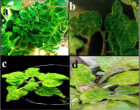
Figure 1

Figure 2
Similar Articles
-
Impact of Calcium Phosphate Nanoparticles on Rice PlantHrishikesh Upadhyaya*,Lutfa Begum,Bishal Dey,P K Nath,S K Panda. Impact of Calcium Phosphate Nanoparticles on Rice Plant. . 2017 doi: 10.29328/journal.jpsp.1001001; 1: 001-010
-
The Effects of Pharmacological Carbonic Anhydrase Suppression on Defence Responses of Potato Leaves To Phytophthora InfestansMagdalena Arasimowicz-Jelonek*,Jolanta Floryszak-Wieczorek. The Effects of Pharmacological Carbonic Anhydrase Suppression on Defence Responses of Potato Leaves To Phytophthora Infestans. . 2017 doi: 10.29328/journal.jpsp.1001002; 1: 011-025
-
Phytochemical content of leaf and stem of Marsilea quadrifolia (L.)Rajangam Udayakumar*,Karikalan Gopalakrishnan. Phytochemical content of leaf and stem of Marsilea quadrifolia (L.). . 2017 doi: 10.29328/journal.jpsp.1001003; 1: 026-037
-
Antagonistic features displayed by Plant Growth Promoting Rhizobacteria (PGPR): A ReviewMohsin Tariq*,Muhammad Noman,Temoor Ahmed,Amir Hameed,Natasha Manzoor,Marriam Zafar. Antagonistic features displayed by Plant Growth Promoting Rhizobacteria (PGPR): A Review . . 2017 doi: 10.29328/journal.jpsp.1001004; 1: 038-043
-
Wild-type Agrobacterium rhizogenes-mediated gene transfer in plants: Agrobacterium virulence and selection of transformantsShu Wei*,Muhammad Abdullah,Ferdinand L Shamalla,Mohammad M Rana. Wild-type Agrobacterium rhizogenes-mediated gene transfer in plants: Agrobacterium virulence and selection of transformants. . 2017 doi: 10.29328/journal.jpsp.1001005; 1: 044-051
-
Effects of Vochysia haenkeana extract on the neuromuscular blockade induced by Bothrops jararaca venom on chick biventer cervicis preparation in vitroYoko Oshima-Franco*,Fernanda Dias da Silva,Natália Tribuiani,Isadora Caruso Fontana Oliveira,Regina Yuri Hashimoto Miura,Rafael S Floriano,Márcio Galdino dos Santos,Sandro Rostelato-Ferreira. Effects of Vochysia haenkeana extract on the neuromuscular blockade induced by Bothrops jararaca venom on chick biventer cervicis preparation in vitro. . 2017 doi: 10.29328/journal.jpsp.1001006; 1: 052-058
-
HBV: Genomic Structure, HBVsAg Isolation and innovative Virotherapy Initiation in the Middle EastAboul-Ata E Aboul-Ata*,Essam M Janahi,I M El-Kalamawy,Kathleen Hefferon,Amal Mahmoud. HBV: Genomic Structure, HBVsAg Isolation and innovative Virotherapy Initiation in the Middle East . . 2017 doi: 10.29328/journal.jpsp.1001007; 1: 059-061
-
Physiological impact of Zinc nanoparticle on germination of rice (Oryza sativa L) seedUpadhyaya H*,Roy H,Shome S,Tewari S,Bhattacharya MK,Panda SK. Physiological impact of Zinc nanoparticle on germination of rice (Oryza sativa L) seed . . 2017 doi: 10.29328/journal.jpsp.1001008; 1: 062-070
-
Effects of Site Factors on the Clonal Growth of Phyllostachys bambusoides f. shouzhu YiXiaohong Gan*,Lijuan Chen,Cuibin Tang,Xia Zhang. Effects of Site Factors on the Clonal Growth of Phyllostachys bambusoides f. shouzhu Yi. . 2017 doi: 10.29328/journal.jpsp.1001009; 1: 071-079
-
Evaluation of genetic diversity in germplasm of paprika (Capsicum spp.) using random amplified polymorphic DNA (RAPD) markersRueda-Puente EO*,Renganathan P,Ruíz-Alvarado C,Hernández-Montiel LG,Prasath Duraisamy. Evaluation of genetic diversity in germplasm of paprika (Capsicum spp.) using random amplified polymorphic DNA (RAPD) markers. . 2017 doi: 10.29328/journal.jpsp.1001010; 1: 080-086
Recently Viewed
-
Investigate the Effect of Coating Concentration and Coating Thickness on the Anti-microbial Properties of Polycarbonate SheetSaleh Alkarri. Investigate the Effect of Coating Concentration and Coating Thickness on the Anti-microbial Properties of Polycarbonate Sheet. Ann Biomed Sci Eng. 2024: doi: 10.29328/journal.abse.1001029; 8: 011-020
-
The Importance of the Concept of Acute Pneumonia for Choosing the Principles of its Treatment and ResultsIgor Klepikov*. The Importance of the Concept of Acute Pneumonia for Choosing the Principles of its Treatment and Results. J Pulmonol Respir Res. 2024: doi: 10.29328/journal.jprr.1001051; 8: 003-008
-
Prospective Coronavirus Liver Effects: Available KnowledgeAvishek Mandal*. Prospective Coronavirus Liver Effects: Available Knowledge. Ann Clin Gastroenterol Hepatol. 2023: doi: 10.29328/journal.acgh.1001039; 7: 001-010
-
Adult Neurogenesis: A Review of Current Perspectives and Implications for Neuroscience ResearchAlex, Gideon S*,Olanrewaju Oluwaseun Oke,Joy Wilberforce Ekokojde,Tolulope Judah Gbayisomore,Martina C. Anene-Ogbe,Farounbi Glory,Joshua Ayodele Yusuf. Adult Neurogenesis: A Review of Current Perspectives and Implications for Neuroscience Research. J Neurosci Neurol Disord. 2024: doi: 10.29328/journal.jnnd.1001102; 8: 106-114
-
Plant growth, Yield and Leaf Nutritional value of Jute (Corchorus olitorius L.) as Influenced by Banana Peel levels under Salt Stress conditions in Coastal region of CameroonMathias Julien Hand*,Chimène Fanta Abib,Kingsley Mbi Tabi,Alphonse Ervé Nouck,Libert Brice Tonfack,Victor Désiré Taffouo,Emmanuel Youmbi. Plant growth, Yield and Leaf Nutritional value of Jute (Corchorus olitorius L.) as Influenced by Banana Peel levels under Salt Stress conditions in Coastal region of Cameroon. J Plant Sci Phytopathol. 2024: doi: 10.29328/journal.jpsp.1001145; 8: 131-140
Most Viewed
-
Evaluation of Biostimulants Based on Recovered Protein Hydrolysates from Animal By-products as Plant Growth EnhancersH Pérez-Aguilar*, M Lacruz-Asaro, F Arán-Ais. Evaluation of Biostimulants Based on Recovered Protein Hydrolysates from Animal By-products as Plant Growth Enhancers. J Plant Sci Phytopathol. 2023 doi: 10.29328/journal.jpsp.1001104; 7: 042-047
-
Sinonasal Myxoma Extending into the Orbit in a 4-Year Old: A Case PresentationJulian A Purrinos*, Ramzi Younis. Sinonasal Myxoma Extending into the Orbit in a 4-Year Old: A Case Presentation. Arch Case Rep. 2024 doi: 10.29328/journal.acr.1001099; 8: 075-077
-
Feasibility study of magnetic sensing for detecting single-neuron action potentialsDenis Tonini,Kai Wu,Renata Saha,Jian-Ping Wang*. Feasibility study of magnetic sensing for detecting single-neuron action potentials. Ann Biomed Sci Eng. 2022 doi: 10.29328/journal.abse.1001018; 6: 019-029
-
Physical activity can change the physiological and psychological circumstances during COVID-19 pandemic: A narrative reviewKhashayar Maroufi*. Physical activity can change the physiological and psychological circumstances during COVID-19 pandemic: A narrative review. J Sports Med Ther. 2021 doi: 10.29328/journal.jsmt.1001051; 6: 001-007
-
Pediatric Dysgerminoma: Unveiling a Rare Ovarian TumorFaten Limaiem*, Khalil Saffar, Ahmed Halouani. Pediatric Dysgerminoma: Unveiling a Rare Ovarian Tumor. Arch Case Rep. 2024 doi: 10.29328/journal.acr.1001087; 8: 010-013

HSPI: We're glad you're here. Please click "create a new Query" if you are a new visitor to our website and need further information from us.
If you are already a member of our network and need to keep track of any developments regarding a question you have already submitted, click "take me to my Query."






